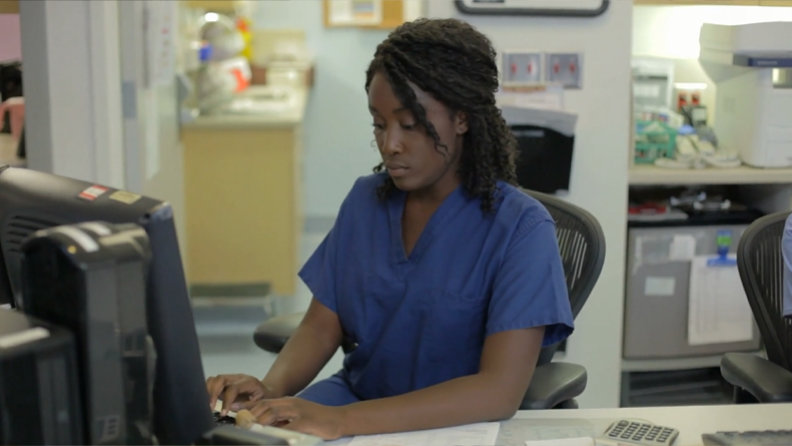Overview
The Dialysis Technician program at the Medical Training Institute of New York provides students with the opportunity to study the principles of dialysis and the anatomy and physiology of the kidney. We also cover fluid and electrolyte balance, hematologic aspects, infectious diseases, dialysis systems and equipment, vascular access to the circulation, dietary regulation, blood chemistries, complications of renal failure, psychosocial elements, and an overview of peritoneal dialysis and renal transplantation.
The program prepares students to work under the supervision of other medical professionals, such as physicians and registered nurses. If you are interested in becoming a dialysis technician, our program could be right for you.
What is Dialysis
Dialysis is the process of removing toxins, excess water, and solutes from the blood in individuals with kidneys that cannot perform this function on their own. Complicated medical processes like this require a specialized professional to administer treatment.
Two Types of Dialysis
Dialysis is a treatment for people whose kidneys have already failed due to disease complications. The two major types of dialysis are hemodialysis and peritoneal dialysis. In hemodialysis, an artificial kidney is used to remove waste and extra chemicals and fluid from a person’s blood. In peritoneal dialysis, blood is cleaned inside the body through a catheter placed into the abdomen, which will then be slowly filled with dialysate. Dialysis technicians can make sure that you undergo a safe procedure.
What does a dialysis technician do?A dialysis technician is a medical professional who administers the dialysis procedure. Technicians work under the supervision of a nurse or physician who accompanies the patient during treatment.
Dialysis technician responsibilitiesA dialysis technician works closely with patients and other medical professionals and is responsible for a wide variety of duties, some of which include:
- Assembling the dialysis machine
- Maintaining a sterile treatment environment
- Ensuring dialysis machines work properly before treatment begins
- Observing patients during treatment to monitor for signs of medical emergencies
- Making alterations to treatment to maintain safe application
- Working with nurses and doctors to administer the correct treatment for each individual
- Explaining the dialysis process to patients and their families
- Teaching patients about additional health care to enhance positive dialysis results
- Prep patients and give local anesthesia
- Create written reports on patient progress for doctors
In addition to the skills needed to properly operate complicated medical technology, a dialysis technician requires a range of soft skills to successfully perform the job. The most common skills include:
Attention to detailMedical roles require a keen eye to notice details and prevent potential errors that could be life-threatening. Dialysis treatment requires technicians to follow a specific set of instructions. They make adjustments based on their recognition of physical changes in the patient and directions from their supervisor.
MultitaskingDuring treatment, a dialysis technician monitors multiple details including the patient's well-being and functions of the dialysis machine. They also must be mindful of other responsibilities that require their attention, such as writing reports and speaking with staff and the patient's family members.
TeamworkA dialysis technician is part of a larger group of medical staff. Each professional in this group must work together effectively and orderly to provide the best medical care possible to every dialysis patient.
Compassion Working with those who are ill requires meaningful empathy skills. Dialysis technicians are closely involved with patients in often difficult times and need to connect with them, provide reassurance and respond to their needs in a caring manner.
CommunicationDialysis technicians must have exceptional communication skills. Before treatment, they will walk patients through the process and need to clearly explain how it works. They also need to communicate with the patient during treatment when adjustments are made and be able to answer patient questions thoroughly.
Communication is also important between dialysis technicians and other medical staff to report on the progress and current physical condition of the patient, both verbally and in written reports.
Tuition & Fees
Course overview
This course prepares students for an entry-level position as a Certified Hemodialysis Technician (CHT) with the required skills, knowledge, and values to function as members of the clinical care team in both chronic (outpatient) and hospital (acute) settings. The course content includes but is not limited to defined CHT skills, interpersonal skills, legal and ethical considerations in healthcare, and Basic Life Support (BLS).
Our Dialysis Technician program provides students with the opportunity to study the principles of dialysis and the anatomy and physiology of the kidney. We also cover fluid and electrolyte balance, hematologic aspects, infectious diseases, dialysis systems and equipment, vascular access to the circulation, dietary regulation, blood chemistries, complications of renal failure, psychosocial aspects, and an overview of peritoneal dialysis and renal transplantation.
The program prepares students to work under the supervision of other medical professionals, such as physicians and registered nurses. If you are interested in becoming a dialysis technician, our program could be right for you.
Program Schedule
SPRING SCHEDULE*
Start Date: 3/12/2025
Expected Graduation Date: 4/25/2025
SUMMER SCHEDULE*
Start Date: 6/4/2025
Expected Graduation Date: 7/22/2025
*Orientation will be held approximately one week prior to the start of the program.
MTI Mission & Goals
The mission of MTI of New York is to offer education in Allied Health for on-demand occupations to members of our community in pursuit of advancing their career path in this employment sector. As such, MTI strives to deliver to its community of learners, opportunities for career advancement, change and expanding industry standards, the optimum delivery of services, which meet and exceed industry expectations, to place graduates at the top of the candidacy pool for positions within their area of choice.
Grading Scale and Methods of Evaluation
| LETTER CODE | INCLUDED IN HOURS EARNED | INCLUDED IN HOURS ATTEMPTED | INCLUDED IN CGPA AND SAP | QUALITY POINTS |
|---|---|---|---|---|
| A = 90 - 100% | Yes | Yes | Yes | 4.00 |
| B = 80 - 89% | Yes | Yes | Yes | 3.00 |
| C = 70 - 79% | Yes | Yes | Yes | 2.00 |
| F = 0 - 69% | No | Yes | Yes | 1.00 |
| AU (audit) | No | No | No | n/a |
| I (incomplete) | No | Yes | No | n/a |
| P (pass) | Yes | Yes | No | n/a |
| PR (proficiency) | Yes | Yes | No | n/a |
| TC (transfer credit) | Yes | Yes | No | n/a |
| W (withdraw) | No | Yes | No | n/a |
| WP (LOA) | No | No | No | n/a |
| NP (not pass) | No | Yes | Yes | n/a |
Admission
GENERAL ADMISSIONS REQUIREMENTS
Prospective students are encouraged to apply for admission as early as possible to secure a place in their desired program and starting date. All applicants are required to complete a personal interview with an admissions representative, which is conducted in person. Guardians or significant others are encouraged to participate in the interview process. This interview helps the institution assess the applicant’s suitability for enrollment.
To complete the enrollment process, applicants must submit the following:
- Application for Admission Form
- Enrollment Agreement
- If under 18 years of age, the Enrollment Agreement must also be signed by a parent or guardian.
- Application Fee Payment
- This fee is non-refundable unless the applicant is denied admission or cancels the application within three days of the institution’s receipt of the application and fee.
- Student and Programmatic Disclosure Forms
- Entrance Exam (if applicable)
- Refer to “Selective Admissions Criteria” for details.
- Request for Official Transcripts
- Required if seeking transfer of previously earned college credit.
- Interview Acknowledgment Form/Student Information Record
The institution reserves the right to deny or rescind an applicant’s eligibility to begin classes if all general and selective admissions requirements are not successfully completed within the required timeframe.
Program-Specific Admission
Admission to one program does not guarantee eligibility for other programs. Applicants wishing to enroll in a different program in the future must independently meet all the requirements for that program at the time of application and undergo the selection process for that program.
Proof of Graduation
Documentation of high school graduation or its equivalent must be provided before the student’s first scheduled class. The student’s responsible for providing valid proof, and additional documentation may be required to verify authenticity. Failure to provide this documentation will result in enrollment cancellation, forfeiture of academic credits earned prior to cancellation
Prospective students must comply with the following admission requirements to enroll:
- Present a Valid picture ID
- Present one of the following:
- High School Diploma
- GED
- an associate or bachelor’s degree official transcript as proof of higher education completion.
- Students enrolling in a program including a clinical component are required to pass the Level 2 Criminal Background Check completed through an MTI of New York third-party.
- To qualify for enrollment, a one-on-one appointment with one of the school admissions’ representatives is needed. During the one-on-one appointment, the admission’s representative will provide advisement services to aid the student in planning and completing the program for enrollment.
- Diplomas and transcripts for education completed in a foreign country must be accompanied by the corresponding official translation and evaluation. For a listing of accepted translators and evaluators visit the National Association of Credential Evaluation Services (NACES) at www.naces.org Our school only accepts translations and evaluations received directly from NACES members, sent directly to our school, and addressed to MTI of New York, attention Admissions Department, 211 East 43rd Street, 2nd Floor, New York, NY 10117.
Selective Admissions Criteria
Some programs require additional testing or institution credit requirements. When the number of applicants exceeds available seats, a rubric is used to objectively assess and rank applicants. Factors considered include:
- Postsecondary coursework and grades (Math and Science focus)
- Entrance exam scores
- Prior graduation from an Allied Health program at another CEC institution
Applicants are ranked, and notifications of acceptance or alternate status will be issued. Alternates will be notified no later than the drop/add period of the class start date. Entrance exams may be waived for applicants holding an associate's degree or higher from an accredited institution.
Entrance Exam Re-Test Policy
Applicants who do not achieve the required score on an entrance exam may retest as follows:
- Second attempt: After a 24-hour waiting period.
- Third attempt: after a 48-hour waiting period.
- Fourth attempt: after a one-year waiting period.
Additional Program-Specific Requirements
- Diagnostic Medical Sonography (DMS) Program: Applicants are assessed using a standardized rubric that includes grades in Math and Science, Accuplacer Math scores, Wonderlic scores, and Program Director recommendations. Ranking determines final cohort acceptance.
Program Entrance Requirements
Students enrolling in the following programs must pass the Wonderlic Scholastic Level Exam (SLE) Entrance Test:
- Students enrolling in a hybrid program.
- Students enroll in an onsite (on campus) program for 300 hours or more.
The Wonderlic Scholastic Level Exam (SLE) minimum passing score is 13. The cost is $ 35 and paid by the student. Students can retake after a week, for a maximum of three (3) times.
| PROGRAM | WONDERLIC SCORE | ACCUPLACER SCORE (OVERALL/MATH) | ADDITIONAL REQUIREMENTS |
|---|---|---|---|
| Cardiovascular Sonography | 18 | 125/60 | Have a criminal background check |
| Diagnostic Medical Sonography | 18 | 130/65 | Have a criminal background check |
| Medical Assistant | 13 | N/A | None |
| Medical Billing | 13 | N/A | None |
| Pharmacy Technology | 13 | N/A | Have a criminal background check |
ASSOCIATE OR ADVANCED DEGREE ADMISSIONS REQUIREMENT
In addition to the general admission requirements, students wishing to enroll in the following programs are required to present an official transcript demonstrating the student has graduated from an Associate, Bachelor, or advanced Degree program from an accredited higher education institution recognized by the United States Federal Department of Education, or its equivalent as approved by an official evaluation and translation by a member of the National Association of Credential Evaluation Services (NACES) at www.naces.org:
- Surgical Technology Programs
- Radiography Technology Programs
- Radiation Therapy Programs
Official transcripts are to be sent directly from the issuing institution to MTI of New York, attention Admissions Department, 211 East 43rd Street, 2nd Floor, New York, NY 10117
You can still apply
Graduation Requirements
To qualify for graduation, students must maintain a minimum 2.0 (C) Grade Point Average and be current with their tuition payments. Students must also satisfy the requirements of any externship or internship in which they have participated.
- A minimum, cumulative GPA of 2.0.
- Complete all documents, files, and examinations, as necessary.
- Comply with all Medical Training Institute of New York regulations.
- Fulfill all financial obligations to MTI of New York.
- Successfully complete an externship as required.
- Return swipe card and ID card
Total Program Cost:
| Program | Dialysis Technician – Hybrid |
| Hours | 160 |
| Application Fee: | $100 |
| Tuition: | $2,200 |
| Technology Fee: | $200 |
| Clinical & Lab Fee: | $600 |
| Uniform Fee: | $66 |
| Total Cost: | $3,308 |
Fees
Registration
A non-refundable Registration fee of $100 is due during registration to reserve a seat in the program.

Clinical/Lab
The Clinical/Lab fee is used to cover the cost of the Liability insurance policy, student lab equipment and supplies, and to provide students with Liability insurance during their clinical rotation internship.

Technology
The Technology Fee provides students with access to Online Learning Resources, the learning management system (“LMS”), and the student portal.

Books
Required books for the specific module of the program a student is entering can be requested from the school bookstore or online at portal.mtiofnewyork.com/stores prior to the start of each quarter.

Uniform
Students can request one (1) set of MTI logo scrubs from the school bookstore or online at portal.mtiofnewyork.com/stores prior to the start of the program. Additional uniforms may be purchased from the school bookstore or online at portal.mtiofnewyork.com/stores.

Tuition
The total cost for the Dialysis Technician program is $3,308, which includes $2,200 in tuition and $1,108 in additional fees. Payments are due before the start of Quarter 1 and are divided into refundable and non-refundable portions, as outlined below.

| Refundable | Non-Refundable | ||||||
|---|---|---|---|---|---|---|---|
| Prior to Quarter 1 | Total | Tuition | Technology | Clinical & Lab | Registration | Uniform | |
| $3,308 | $2,200 | $200 | $600 | $100 | $66 | ||
Confirmation of Fee Terms:
- Tuition refunds will be processed in accordance with the program’s refund calculation policy, as governed by New York State.
- Technology and Clinical/Lab fees are refundable only if a refund request is made before the start of a quarter.
- Uniform fees must be paid prior to Quarter 1 and are non-refundable.
- Books are not included in the tuition and must be purchased prior to the start of class.
Paying For Your Program
PAYMENTS
Method Of PaymentThe Student Accounts Office offers a veriety of payment options, including online payments, credit cards, checks, wire transfer, Western Union, Paypal, and cash; both Monthly/Bi-Weekly/Weekly Paymeny plans and as a lump sum. Students who desite greater flexibility
In all cases, Program Tuition and Fees must be paid in full (in US Dollars) before your course’s enrollment deadline based on the table in the Tuition section above.
- Payment Options
- Payment Plans may be available to students
The Payment Plan allows you to pay quarter Tuition and fees over four installments per quarter. A suggested initial down payment of $1,650 of the total tuition cost is required for all quarter programs, after which the remainder of the tuition is divided into five installments per quarter.
To enroll in the Payment Plan, please email StudentBilling@mtiofnewyork.com. Be sure that “Payment Plan” appears in your message’s subject line. Visit our website www.mtiofnewyork.com for a more detailed explanation.
Private Education LoansStudents may elect to apply for a loan and choose to pursue loans to cover the cost of their education or any part of it, over a Term or a Quarter. You can take out loans to cover the entire cost of the Program, or just a part of the cost, as a supplement to your Monthly/Bi-weekly/weekly income. For more information, visit our website
https://www.mtiofnewyork.com/medical-training-institute-student-financial-services/Students must provide a signed promissory note from the issuing body. This agreement will become effective when the signed promissory note is provided to the school
Refund Policy
-
A student who cancels within 7 days of signing the enrollment agreement receives all monies returned, with the exception of the non-refundable registration fee.
-
Thereafter, a student will be liable for
- The non-refundable registration fee plus
- The cost of any textbook or supplies accepted, plus
- Tuition liability as of the student’s last date of physical attendance.
Tuition liability is divided by the number of quarterly in the program. Total tuition liability is limited to the quarter during which the student withdrew or was terminated, and any previous quarter completed.
Termination
During the first quarter of the program:
If termination occurs Student Refund School may keep Student Refund Prior to or during the first week 0% 100% During the second week 25% 75% During the third week 50% 50% During the fourth week 75% 25% After the fourth week 100% 0% During the second and remaining quarters of the program:
If termination occurs Student Refund School may keep Student Refund Prior to or during the first week 25% 75% During the second week 50% 50% During the third week 75% 25% During the fourth week 100% 0% -
The student refund may be more than that stated above if the accrediting agency refund policy results in a greater refund.
Refunds are calculated based on the student’s last day of physical attendance and the total quarter’s tuition due, not the total tuition paid by the student up to that point. If a student withdraws during the second term/quarter, the student must use the “First Term/Quarter” schedule unless the school can demonstrate that no significant educational change has occurred in the program as of the student’s last date of attendance. Significant educational change is defined as non-functioning educational equipment which adversely affects a student’s educational program, a material change in the student’s schedule as agreed to at the time of the student’s enrollment, substitution of a teacher in a course after instruction has begun where such teacher does not possess the necessary language skills in the approved language of instruction in order to effectively communicate the subject matter to the students, or a significant increase in the student to teacher ratio. If no significant educational change has occurred at the beginning of the second term/quarter, the refund policy for subsequent terms/quarters applies. The student refund may be more than that stated above if the accrediting agency refund policy results in a greater refund.
Textbooks
- Review of Hemodialysis for Nurses and Dialysis Personnel, 10th Edition
ISBN: 9780323641920
- Review of Hemodialysis for Nurses and Dialysis Personnel- Elsevier eBook
on VitalSource, 10th Edition
ISBN: 9780323674423
Click here to order your books: https://evolve.elsevier.com/cs/store?role=student
Instructors
Dr. Daniel Arzanipour
Dr. Gavriel Mullokandov
Apply Now
Dr. Daniel Arzanipour
Dr. Gavriel Mullokandov
Credential
Dialysis technician certificationAll dialysis technicians must receive a certification within 18 months of hire. The government recognizes three credentialing agencies with a total of seven certification options. Each agency requires a high school diploma or equivalent education for certification. Nationally recognized certifications include:
The National Nephrology Certification Organization
The National Nephrology Certification Organization (NNCO) offers three certifications for dialysis technicians, one of which is a specialty certification:
Certification Examination in Clinical Nephrology Technology (CCNT):To qualify for the CCNT you must have completed a one-year certificate program, or a shorter program with work experience, and pass the exam. The exam consists of 200 multiple-choice questions regarding safety and infection control, proper patient care and dialysis principles and procedures. The exam has a three-hour time limit.
Certification Examination in Biomedical Nephrology Technology (CBNT):This certification is for dialysis technicians who repair and maintain the machines and equipment for water treatment. This exam also consists of 200 multiple choice questions and has a three-hour time limit, but discusses topics such as principles of dialysis, equipment functions and water treatment.
Certification Examination for Dialysis Water Specialists (CDWS):This specialty certification is for technicians who have experience in dialysis water treatment. It includes 175 multiple choice questions with a three-hour time limit and includes content on water treatment, water purification equipment and disinfection strategies and prevention.
All certification holders must recertify every four years and meet additional criteria required by the individual certifications.
The Nephrology Nursing Certification Commission
The Nephrology Nursing Certification Commission (NNCC) offers two certifications for hemodialysis technicians, which is another term for dialysis technician:
Certified Clinical Hemodialysis Technician (CCHT):To qualify for the CCHT, a candidate must complete an educational program and clinical practicum. The exam consists of 150 multiple-choice questions and has a three-hour time limit. Questions test medical knowledge and the ability to apply that knowledge in a real-world setting.
Certified Clinical Hemodialysis Technician Advanced (CCHT-A):The CCHT-A is reserved for working technicians with at least five years of experience and tests more advanced knowledge.
The CCHT must be renewed every three years and candidates must have proof of at least 3,000 hours of work as a dialysis technician and 30 hours of continuing education.
The Board of Nephrology Examiners Nursing and Technology
The Board of Nephrology Examiners Nursing and Technology (BONENT) offers two certifications:
Certified Hemodialysis Technician/Technologist (CHT):To qualify for the CHT, a candidate must graduate from a BONENTapproved certificate program or have one year of work experience as a technician. The exam consists of 150 multiple-choice questions with a three-hour time limit and covers patient care, water treatment and machine technology, and education and professional development.
Certified Hemodialysis Biomedical Technician (CHBT):The CHBT is specifically for dialysis technicians who repair and maintain dialysis equipment. This exam also consists of 150 multiple-choice questions with a three-hour time limit and focuses on eight domains of practice and tasks involved in hemodialysis technology, such as medical machine maintenance and water treatment system management.
Renewal for BONENT certifications requires 40 hours of continuing education or professional activity or retaking the exam. A one-time continuing education waiver is available.
Keep in mind that states have individual requirements regarding certification, so make sure to research the regulations of the state you intend to work in. Also, check the detailed eligibility requirements of each examination.
BONENT-Examination PrepMTINY Prepare students for the Certified Hemodialysis Technician (CHT), Certified Clinical Hemodialysis Technician (CCHT), and Certified Clinical Nephrology Technician (CCNT) exams.
Admission Requirement: GED/High School DiplomaWHAT YOU'LL LEARN

- Intro to Hemodialysis Health Sciences
- Medical Terminology
- History of Dialysis
- Ethics and Law
- Scientific Principles of Dialysis
- The Water Treatment System
- Renal Anatomy
- Types of Kidney Disease
- Diabetes & Clinical Complications
- Hemodialysis Machine Technology-Device
- Central Venous Catheters
- Payment for Dialysis and Transplant
- Infection Control
- Monitoring During Dialysis
- Post-Dialysis Procedures
- Dialyzer Reuse
- Renal Nutrition and Diet Restrictions
- Peritoneal Dialysis
- Pediatric Dialysis
- Dialysis Medications
- Vascular Access
- Skills Laboratory Training
- Hemodialysis Clinical Simulation
- Professional Development
- Career Development Services
- BONENT-Examination Prep
WHO WILL BENEFIT

Those Considering Nursing
If your goal is to become a Hemodialysis Nurse, starting out as a dialysis Technician is a great opportunity to explore the nursing field. You'll get the chance to work alongside LPNs and RNs in a variety of healthcare settings, earning invaluable experience and skills along the way

Aspiring Medical Professionals
Working as a dialysis Technician gives many of us our first taste of working in the medical field. You might gain inspiration to continue that career path and get a more in-depth understanding of the medical world. It's okay to share this desire with your interviewer. It shows your dedication to the field and a willingness to learn

Job Stability
The U.S. Bureau of Labor Statistics projects that employment in health care occupations are expected to grow 15% between 2019 and 2029, which is significantly faster than average for all occupations. (www.bls.gov). PayScale.com reported that the median annual salary for dialysis technicians was $40,851 as of December 2021.
Winter Session
January 7, 2026
Total hours: 160
Day, Evening, Weekend Options
Weekdays: 13 Weeks
Weekdays: 12 hours
Tuition Cost: $2,200
Total Program Cost: $3,308
Apply NowSchedule of Sessions Options
9:00 AM - 1:00 PM
Morning Classes
The day program is 13 weeks long. Students attend classes 12 hours a week attending classes Monday through Wednesday.



